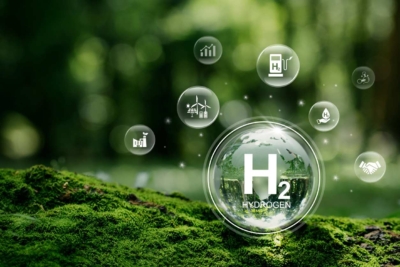Green hydrogen is emerging as a game-changer in the quest for sustainable energy. Unlike traditional hydrogen derived from biomass and fossil fuels, green hydrogen is produced using renewable energy sources like wind and solar power.
The importance of green hydrogen lies in its potential to revolutionize the energy sector by providing clean, efficient, and versatile alternatives to fossil fuels. As we face the pressing need to reduce carbon emissions and combat climate change, green hydrogen offers a promising solution that can significantly contribute to a greener future for all.
What is Green Hydrogen?
Green hydrogen is a gas produced through water electrolysis powered by renewable energy sources. This process involves splitting water molecules into hydrogen and oxygen using electricity generated from wind, solar, and hydroelectric power.
The importance of green hydrogen is underscored by its ability to create a zero-emission fuel, as oxygen is the only byproduct of this process. This clean production method differentiates green hydrogen from other types of hydrogen, such as grey hydrogen. Grey hydrogen is produced from natural gas and emits significant amounts of CO2.
How Does Green Hydrogen Work?
The production of green hydrogen begins with electrolysis. First, water is split into oxygen and hydrogen using an electric current sourced from renewable energy. Then, it can be stored and transported as a gas or a liquid and used in fuel cells to generate electricity. These fuel cells can power everything from vehicles to large-scale power plants, providing a reliable and clean energy source.
Additionally, green hydrogen can be integrated into existing natural gas infrastructure, making it a flexible option for various energy needs.
How is Green Hydrogen Used?
Green hydrogen’s versatility extends to numerous applications across different sectors. In transportation, it can power fuel cells for vehicles, which emit only water vapor. In power generation, it can be used in gas turbines to produce electricity with zero emissions.
Industrial sectors, such as steel and chemical manufacturing, are also exploring green hydrogen options to replace carbon-intensive processes. The importance of green hydrogen is particularly significant in sectors that are challenging to electrify, providing a pathway to decarbonize industries that traditionally rely on fossil fuels.
What is the Future of Green Hydrogen?
The future of green hydrogen looks promising, with increasing investments and innovations driving its adoption. Governments and companies around the globe see the importance of green hydrogen in achieving climate goals. They have been investing in research and development to improve its efficiency and reduce costs.
As technology advances, the production and utilization of green energy are expected to become more widespread and play a crucial role in the global energy transition. With continued support, green hydrogen could become a cornerstone of a sustainable and resilient energy system.
How Does Green Hydrogen Help the Economy?
The importance of green hydrogen extends beyond environmental benefits to significant economic advantages. Transitioning to a green hydrogen economy can create jobs in manufacturing, installing, and maintaining hydrogen infrastructure. It also promotes energy independence by reducing reliance on imported fossil fuels.
Green hydrogen can stimulate technological innovation and investment in renewable energy projects, making it a long-term, sustainable, and stable solution in the face of global energy challenges.
Why is Hydrogen Important?
Hydrogen is a clean, versatile energy carrier that can be used in various applications, from transportation to industrial processes. Its primary importance lies in its ability to reduce greenhouse gas emissions and provide a sustainable energy source. Unlike fossil fuels, hydrogen does not produce harmful emissions when used. Thus, it is a vital component of growing a low-carbon economy and achieving global climate goals.
What Are the Pros and Cons of Green Hydrogen?
Advantages
 Green hydrogen offers numerous advantages, making it a vital component of the sustainable energy landscape. Here’s a look at some of the key benefits of green hydrogen:
Green hydrogen offers numerous advantages, making it a vital component of the sustainable energy landscape. Here’s a look at some of the key benefits of green hydrogen:
- Zero emissions, contributing to a cleaner environment
- Versatility in various applications, including industrial processes and transportation sectors
- Potential for large-scale energy storage
- Production from abundant renewable resources, enhancing energy security and sustainability
Drawbacks
Despite its many benefits and the overall importance of green hydrogen, there are also challenges to consider, including:
- Current high production costs
- Need for significant infrastructure investments
- Energy loss in production and conversion processes
Discover the Benefits of Green Energy with Spring Power & Gas
As we navigate the path toward a sustainable future, the importance of green hydrogen cannot be overstated. It offers clean, versatile, and efficient energy solutions, which can help address climate change and promote economic growth and energy independence.
Spring Power & Gas is committed to supporting eco-friendly practices and providing our customers access to innovative energy solutions. By joining us, you can also benefit from our rewards and exclusive deals while contributing to a greener planet. Explore our energy plans, learn how we compare to other providers, and discover how you can be part of today’s green hydrogen revolution!




